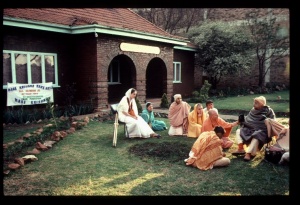SB 11.18.19

A.C. Bhaktivedanta Swami Prabhupada
Please note: The synonyms, translation and purport of this verse were composed by disciples of Śrīla Prabhupāda
TEXT 19
- bahir jalāśayaṁ gatvā
- tatropaspṛśya vāg-yataḥ
- vibhajya pāvitaṁ śeṣaṁ
- bhuñjītāśeṣam āhṛtam
SYNONYMS
bahiḥ — outside of urban areas, in a secluded place; jala — of water; āśayam — to a reservoir; gatvā — going; tatra — there; upaspṛśya — being purified by contact with water; vāk-yataḥ — without speaking; vibhajya — duly distributing; pāvitam — purified; śeṣam — remnants; bhuñjīta — one should eat; aśeṣam — completely; āhṛtam — gathered by begging.
Translation and purport composed by disciples of Śrīla Prabhupāda
TRANSLATION
Taking the food gathered through begging, one should leave the populated areas and go to a reservoir of water in a secluded place. There, having taken a bath and washed one's hands thoroughly, one should distribute portions of the food to others who may request it. One should do this without speaking. Then, having thoroughly cleansed the remnants, one should eat everything on one's plate, leaving nothing for future consumption.
PURPORT
Śrīla Bhaktisiddhānta Sarasvatī Ṭhākura explains that a saintly person should not argue or quarrel with materialistic persons who may request or demand part of his foodstuff. The word vibhajya indicates that one should give something to such persons to avoid disturbance, and then, offering the remnants to Lord Viṣṇu, one should eat everything on one's plate, without saving food for the future. The word bahiḥ indicates that one should not eat in a public place, and vāg-yata indicates that one should eat silently, meditating upon the Lord's mercy.